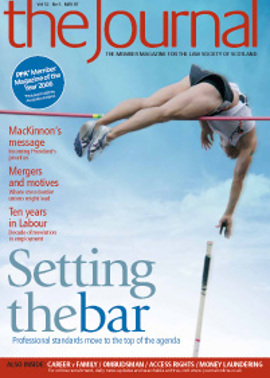Alterations are no 2 problem
Unauthorised alterations are one of the top two causes of problems for clients (whether buyers or sellers) in conveyancing transactions, according to 60% of solicitors, and the problem is if anything increasing.
These are among the main findings of the Society’s online survey, carried out in March, into the scale of the problem and the extent of the difficulties it causes.
The survey, consisting of a dozen multiple choice questions, attracted nearly 300 responses, a statistically valid figure according to James Ness, the Society’s Deputy Director of Professional Practice. On the findings he added:
“While there appears to be no clear conclusion other than that the problem is widespread, multifaceted and significant, it is obvious that hardly any members feel the problem with unauthorised alterations is getting better, and the delays in process and cost consequences to the public are significant and clear.”
Some of the main figures to emerge in the results are:
- 31% report that alteration enquiries are necessary in at least 60% of transactions, though 26% put the proportion in the 20-40% band
- only a minority of cases are resolved by the seller providing additional documentary evidence, or seller and buyer agreeing a compromise; local authority reinspection and consent is the more common outcome
- 42% consider the volume of enquiries to be stable, 43% say it is increasing and only 15% report a declining trend
- 33% estimate the average delay to the conveyancing process at 5-10 days, 24% at 10-15 days and 18% put it at over 15 days
- costs to the client (including legal fees) from seeking retrospective consent amount to over £250 in 35% of cases and between £150 and £250 in a further 47%
- only 18% consider the retrospective consent process to be consistently applied in all cases (58% some of the time; 24% not at all); similar figures apply to the good/average/poor rating of the information provided.
On the questions seeking opinions as to the most common causes of problems for clients, only “late or incomplete loan instructions” scored higher: a total of 64% placed this as one of the top two. There then follow issues relating to appliances/heating warranties (23%), deliberate underpricing of the property (16%), lack of information about the property (11%), offers subject to survey (10%), and finally anti-money laundering compliance and multiple surveys, which both scored 8%. (These figures total 200% as separate questions asked about the most and second most common causes of difficulty.)
“The answers to these last two questions are particularly illuminating and validate what many of us have instinctively felt”, James Ness commented.
The Conveyancing Committee will use the findings to inform its response to the consultation on the purchaser’s information pack (which does not address the issue), and to press COSLA for a more consistent approach by local authorities in dealing with enquiries.
In this issue
- Block fees: the story behind the changes
- Strategic advance
- Court plans with little appeal
- Under commission
- Two into one can go
- Ten years of labour
- Career v Family
- Monitor - at your own risk
- Raising the standard
- Society shapes the changes
- Society shapes the changes (1)
- Money laundering to change again
- Border and Immigration Agency launches
- Dealing positively with client concerns
- From the Brussels office
- Winning ways
- Toothless against spam?
- Risk reinvented
- Technical but essential
- Pension sharing tips on divorce
- In pursuit of simplicity
- In pursuit of simplicity (1)
- First in the class
- Scottish Solicitors' Discipline Tribunal
- Website reviews
- Book reviews
- On the road
- Access or excess?
- Alterations are no 2 problem
- ARTL: upgrade now for security






